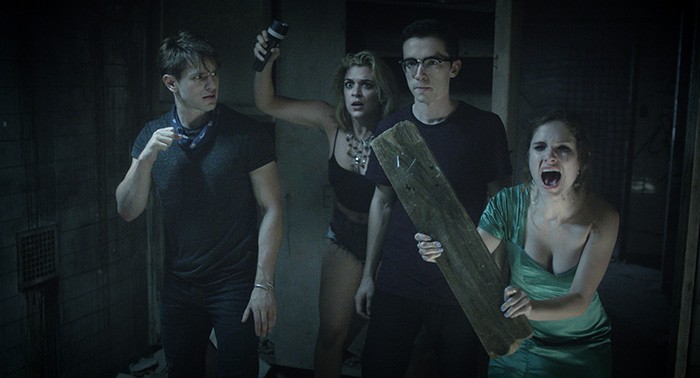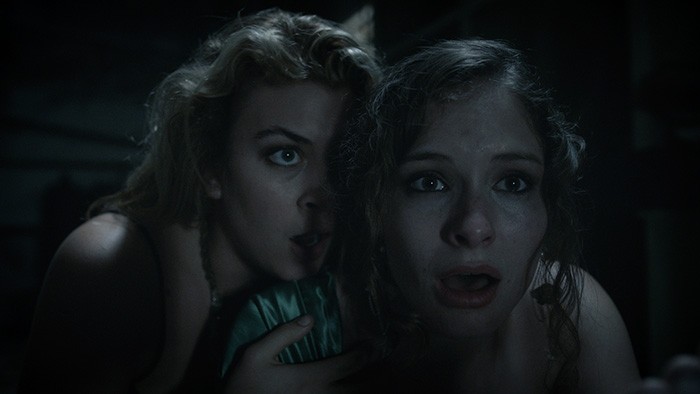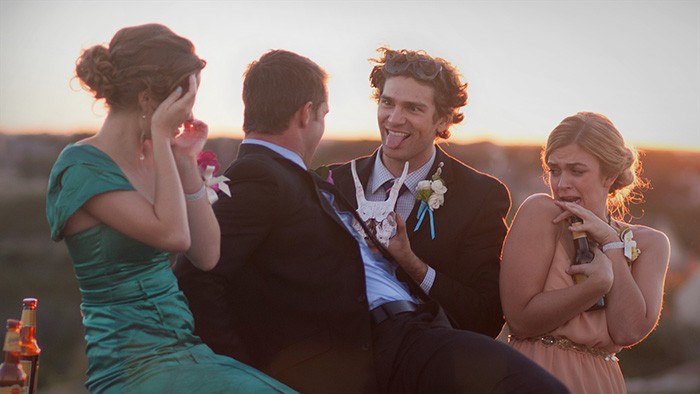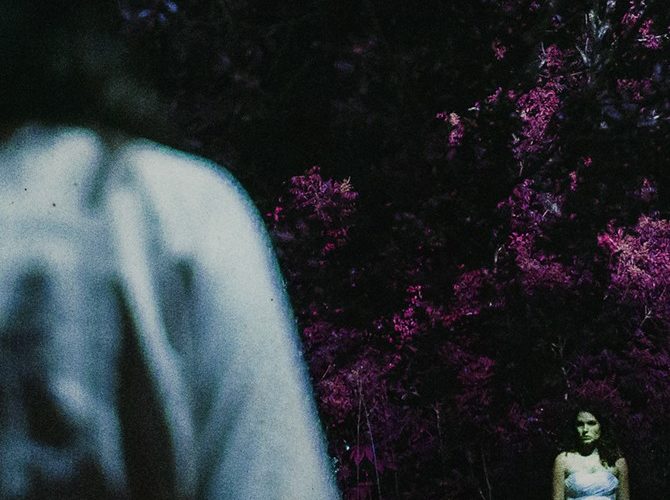If Karen Skloss’ feature narrative debut The Honor Farm possesses anything it’s an abundance of style. This is a gorgeously shot prom night turned mushroom trip romp of millennial excess caught in the throes of dream. We meet Lucy (Olivia Grace Applegate) walking through the woods in her dress — trees covered in toilet paper and forests of white light and ribbons manifesting a border between danger and safety. The evil (assumedly) arrives in the form of a person adorned by a stag’s head (the eyes blink); her salvation a boy with what we hope is love in his heart. It’s fantasy seeping into reality or perhaps just a series of quick visions devoid of truth beyond emotion rendered as experience. And as soon as it arrives it’s gone.
From disorienting, flickering beauty comes a dentist’s chair in stark contrast. Prom hasn’t happened yet as we see Lucy finishing a teeth-whitening treatment to prepare herself for what could be the night her virginity is lost. Maybe those images were her subconscious creating a magical scenario able to cultivate trepidation as far as whether Jake the jock (Will Brittain) is truly the guy worthy of such an unforgettable event. Maybe it was angel and devil merging into profound lark rather than sitting atop her shoulders, the weight of the occasion warranting deep thought lust didn’t desire to give. While I assumed we’d revisit some of that fantasy again through recollections in the moment, I never expected them to re-form and morph into a bacchanalia of nightmare and love.

How you reconcile this result will dictate how much you enjoy the film —
or at least how successful you believe it was at accomplishing its goals. I find myself somewhere in between adulation and frustration because the aesthetics, atmosphere, and hallucinatory nature of it all was impressive to experience. But it also couldn’t stop itself from proving willfully misleading, incoherently woven, and off the mark as far as achieving what I think was an otherworldly metaphor for sex as rite of passage into adulthood. The latter is definitely unavoidable as an abstract concept constantly present beneath the action, but it’s felt as a result of the internal machinations of Lucy’s mind rather than the occult-based ceremony that’s as likely to have been a mass illusion as concrete occurrence.
So how then do we take what happens? Can we honestly be sure anything we see is real? And is that which we believe isn’t a manifestation of one mind, multiple minds, or a double twist revelation away from also being real? The logical starting point to deciphering answers is breaking the film apart into three pieces: dreamy prologue, reality-set exposition, and uncertain aftermath of a drug-fueled adventure into the “haunted” former prison of the title. So we can assume Lucy and Annie (Katie Folger) are BFFs and that Jake is a tool. We can assume Lucy and Annie are of a popular sect of their high school, one that doesn’t look down upon others (like Dora Madison’s goth-like Laila) as much as doesn’t see them at all.
We therefore want these bubbly, not-quite princesses to venture down the rabbit-hole Laila presents from the passenger seat of a hearse. We want them to be shaken from the doldrums of suburban expectation and clichéd cultural norms on behalf of fringe characters like Shanti (Josephine McAdam), Zoe (Christina Parrish), Jesse (Michael Eric Red), Sinclair (Liam Aiken), and JD (Louis Hunter). They can provide Lucy the moment of realness she craves to wake up from an unfulfilled life constantly overshadowed by dream. And they do — perhaps too well once some adult strangers stumble upon their midnight place of trespass escape. Suddenly demons, fire, and blood arrive with what feel like honest stakes within a newfound slasher intent. But are they? Or is everything that’s captivating hollow beneath its façade?

I want there to be substance and admit my desire to discover some exists is strong enough to hope I’ll get a chance to watch the film again. Skloss (and co-writer/teenage daughter Jasmine Skloss Harrison) have created a work of art that begs for interpretation and dissection even if audience confusion is what demands both. I feel as though my complete ignorance towards how or why an instance of murder (with an oddly uncredited Michelle Forbes involved) can be forgotten so quickly means I missed something because that makes more sense than presuming the filmmakers didn’t have purpose. Too much of this event is rendered real by what’s seen at the end to dismiss it and yet there’s also too much proven false to ever believe.
We must therefore disconnect what we see from what we feel. To enjoy the film is to accept that Skloss is placing us in a mushroom-infused stupor along with her characters. Reality doesn’t therefore exist until they (and we) escape the trees so that the newly risen sun can illuminate what remains of the impossible, magical night of tears, revelry, hedonism, and fright. We are forced to remember what came before the result with a grain of salt, the consequences of everything made inconsequential when not directly affecting Lucy at the center. Who dies and who lives is meaningless outside of how each fated event pushed Lucy to where she finds herself at the conclusion. Everything builds towards her loving metamorphosis or torturous desecration. She’s the star.

And that’s okay because she is the most mysterious and three-dimensional figure within the whole. She’s the epitome of our insecurities, aspirations, and promise. A night played by the book of tradition has the potential of ending in pain while one tossing all rules aside peels back a curtain on happily-ever-after. Lucy must choose one or the other — a choice posited in the first five minutes. Where I have issue is the fact that her real moment of truth comes well after she’s already made that choice. The simple fact that she’s in the woods and not a hotel room means she chose and yet the demons haunting her waking thoughts want an answer anyway. This is why I wonder if the stag demon was in fact there.
Thus I’m unable to truly embrace what I saw beyond its stunning visuals and dense content woven with an intricate handle on movement, sight, and sound via sharp cuts from image to image. If I can delve deeper into deciphering the story beneath that in the future, I may revalue my appreciation as stupefied wonder. Some are certain to feel exactly that right now, the film opening up and speaking to them as it just isn’t quite doing so with me. Perhaps I’ve been aged out from the subject matter or maybe I’m trying to read into every little thing with too much force. I could appreciate Skloss explaining how it was all a sensory experience, meaningless when removed from Lucy’s fate. But I would still crave more.
The Honor Farm screened at the Fantasia International Film Festival.

